Walker says EPA should be limited “umbrella organization”
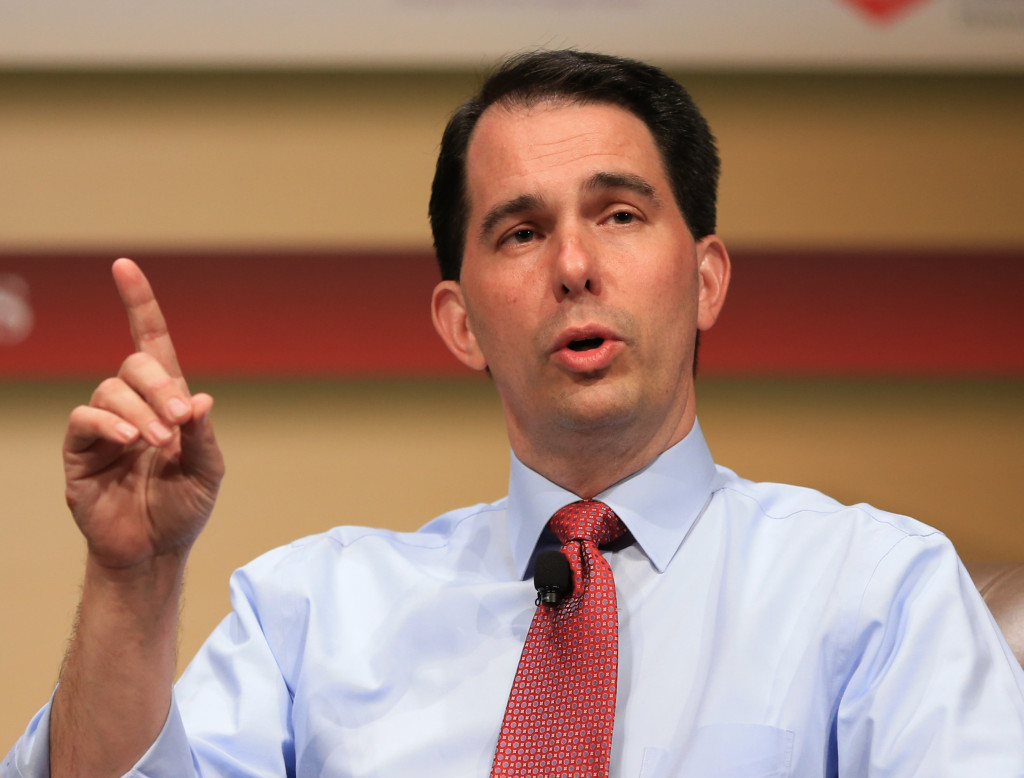
Republican presidential candidate Scott Walker said Monday he would shift most of the responsibilities of the U.S. Environmental Protection Agency to state-based regulators, leaving the EPA to serve as an “umbrella organization” that would resolve disputes among them. Like many Republicans, the Wisconsin governor is a vocal critic of the agency charged with enforcing the nation’s laws against pollution. While Walker said he would not eliminate the EPA if elected president, he would shift its powers and resources to state environmental agencies such as Wisconsin’s Department of Natural Resources. In an interview with the Washington Examiner, and later during a campaign stop in Chicago, Walker said the proper role for the EPA is to serve as a mediator to resolve disputes between such state agencies. The EPA, Walker said, should become “an umbrella organization that really is limited to mediating interstate conflicts over, say, where a body of water or a piece of land goes through multiple states.” The EPA currently has the primary responsibility for enforcing many of the nation’s federal environmental laws and regulations, such as the Clean Water Act, and sometimes issues policy or guidance to encourage states to comply with those laws. For example, the EPA says its proposed rule that aims to reduce greenhouse gas emission from coal-fired power plants gives states flexibility to come up with their own plans to meet the targets set by the EPA. Lisa Heinzerling, a law professor at Georgetown University and former EPA associate administrator, said Walker’s approach would instead result in 50 different air quality standards and 50 different states conducting basic scientific research to support environmental protection. “If Gov. Walker really does desire meaningful environmental protection in this country, taking power from EPA and giving it to all 50 states is a very silly way to achieve it,” she said. “His idea is a really inefficient, and almost certainly ineffective, way of protecting the environment.” Proposals to dramatically scale back the EPA, its duties and responsibilities have been popular with Republicans for years. Former House Speaker Newt Gingrich in 2011 was one of the first Republicans to call for an outright elimination of the agency, and former GOP presidential candidate and U.S. Rep. Michele Bachmann called it a “job-killing organization.” Wisconsin is one of 15 states suing the EPA over a proposed plan that requires states to cut carbon dioxide emissions by 30 percent by 2030. Walker sent a letter to President Barack Obama in May calling the proposed rule “unworkable,” “riddled with inaccuracies” and “questionable assumptions” that made it unworkable for Wisconsin. The EPA has accused Walker’s administration of failing to adequately protect air and water quality since 2011, when he became governor. The EPA said last year that it would impose rules for limiting fine particle pollution in Wisconsin if the state didn’t submit overdue plans for controls on smokestack emissions. Walker’s campaign spokeswoman, AshLee Strong, said he would release more details about his plans for the EPA – along with other ways he wants to empower states – in the coming months. George Meyer, who served as secretary of the Wisconsin Department of Natural Resources between 1993 and 2011, said the agency he led – and to which Walker proposes giving more power – would be unable to fill the role now played by the EPA. “There was constant pressure on states to lower environmental regulations and enforcement because of competition between states,” said Meyer, who is now the executive director of the Wisconsin Wildlife Federation and among Walker’s vocal critics in Wisconsin. A strong federal EPA is needed, he said, “to keep a level playing field between the states, otherwise it becomes a race to the bottom.” Republished with permission of The Associated Press.
Judge says BP spill damage payouts to local entities to start soon

A federal judge says BP will begin paying up to $1 billion in settlements to compensate local governments across the Gulf Coast for lost tax revenue and other economic damages they blame on the company’s 2010 oil spill. An order issued Monday by U.S. District Judge Carl Barbier said all of the payments to local governments must be made within 30 days. BP’s Macondo well blew out on April 20, 2010, leading to deadly explosions aboard the Deepwater Horizon drilling rig and the nation’s largest offshore oil spill. The federal government used a team of scientists to calculate that about 172 million gallons spilled into the Gulf. BP put the number much lower, closer to 100 million gallons. July 15 was the deadline for about 500 local governments in five states to decide whether to accept BP’s settlement offers as part of a broader $18.7 billion agreement with the five Gulf states and the federal government over damage from the spill. Barbier’s order says BP says most local government entities have accepted the settlement. A handful of local governments have not accepted to settle and are continuing to fight for more money. Among those not taking the settlement are Plaquemines Parish in Louisiana and Orange Beach in Alabama. Both locations were heavily oiled by the spill. Plaquemines, for instance, says that the compensation offered for heavy oiling of its marshland isn’t sufficient. The parish says that about 10,000 acres of parish land was heavily oiled and that in all about 40,000 acres of coastal area was damaged by the spill. Government entities are expected to receive varying amounts in compensation according to how much damage they suffered. Jefferson Parish is expected to receive about $53 million for damage it suffered, the highest expected payout so far. Coastal areas in the parish, in particular Barataria Bay, sustained a lot of damage. Republished with permission of The Associated Press.
Jeb Bush team bullish on Iowa
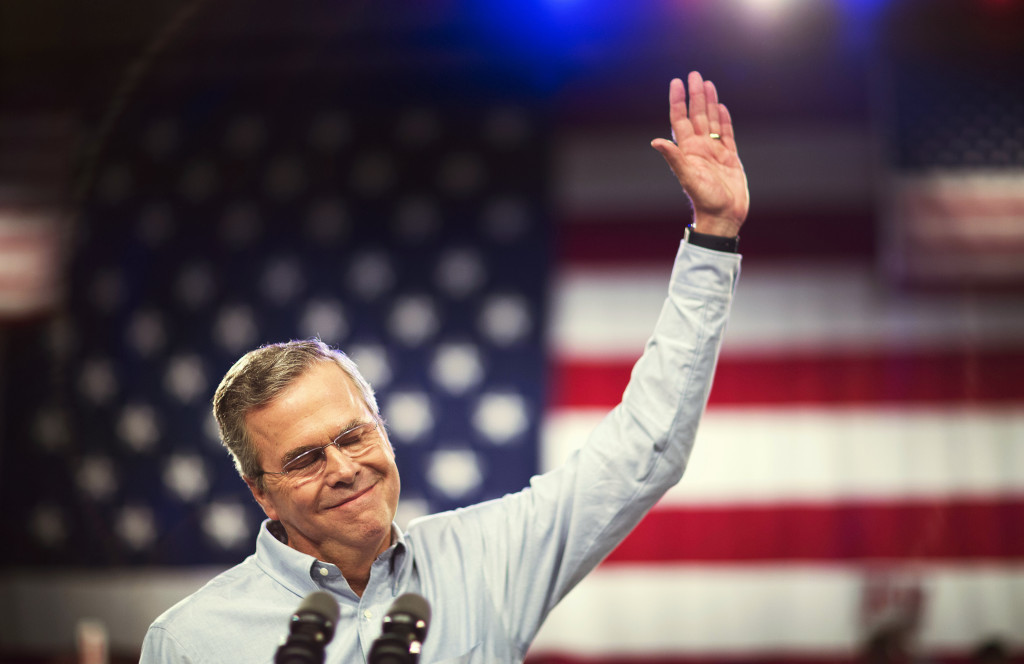
When Jeb Bush announced this year that he wouldn’t participate in the Iowa Straw poll in August, it was immediately viewed by some pundits as the equivalent of the Bush campaign pulling out the white flag, essentially giving up on the socially conservative state. In retrospect, his pullout was ahead of the curve in other Republicans bailing out on the event, which was officially canceled a few weeks later. And according to the latest polls, Bush is competitive in the Hawkeye State. Leading his campaign in Iowa is Annie Kelly, who was working with Bush’s Right to Rise Pac before she was placed in charge of Iowa. In 2011, she was deputy state director for Tim Pawlenty’s Iowa campaign, and then managed then-U.S. Rep. Tom Latham’s successful Iowa re-election campaign. “We are 27 weeks out of the caucuses. We’re in full campaign swing out here,” Kelly told Bush donors on a nationwide conference call on Monday afternoon. With as many as 17 candidates to be on the ballot when Iowans caucus on Feb. 1, Kelly predicted that the winning candidate is likely to need only to get to 17 or 18 percent to be successful – or a total of 23,000 votes. “The difference between first and third place could be a couple of hundred (votes),” Kelly said. “I say that to emphasize that the stakes are very high here – media coverage all is really driven by the performance in Iowa.” With 99 counties in Iowa and 1,774 precincts in the state, Kelley said it was crucial to captains in everyone of those precincts. She called that a “big ask,” saying that person isn’t being asked to show up at a precinct on caucus night to show support, but also must attend at least one training session, and prepare to give a public speech in front of all of their neighbors. An NBC News/Marist poll released over the weekend shows Scott Walker in the lead in Iowa with 19 points, Donald Trump second with 17 points, and Bush third at 12 percent. Kelly concluded by saying that the job of the organizers in Iowa was to build a “high floor,” with the candidate and his communications team in charge of the ceiling.
Libertarian donors put up $6 million for Rand Paul GOP bid

Deep-pocketed libertarians are giving big to help Rand Paul win the Republican presidential primary. Three super PACS supporting the libertarian-leaning Kentucky senator said they raised a combined $6 million through June 30. That’s on top of the nearly $7 million that Paul’s campaign reported pulling in between his April announcement and the end of last month. “There are some very wealthy libertarians out there, and they’re all going to be hearing from me,” said Ed Crane, president of one of the pro-Paul super PACs, called Purple PAC. “It’s a strong potential base for Rand.” Paul’s top backer so far is Jeff Yass, managing director of high-frequency trading firm Susquehanna International Group, who split a $2 million contribution last month between Purple PAC and another pro-Paul super PAC, America’s Liberty. Yass and Crane know each other through the Cato Institute, a free market think tank in Washington that began in the 1970s with the backing of billionaire energy executives Charles and David Koch. Crane is a co-founder, and Yass is a board member. Joining Yass in the $1 million donor club is George Macricostas, head of a data center company called RagingWire. Those two accounted for most of America’s Liberty’s $3.1 million in fundraising so far this year. A third super PAC, Concerned American Voters, has not yet filed a fundraising report, but its leaders said they’ve raised $1.9 million. Scott Banister, a tech investor in Silicon Valley, is among the donors. Matt Kibbe, senior adviser to Concerned American Voters and former leader of the libertarian activist group FreedomWorks, said Paul is testing the idea that libertarian donors will make a major investment in a candidate, not just a cause. “Libertarians are used to giving to ideas and issues campaigns,” Kibbe said. “Do they make the leap and give to a liberty-minded candidate with a pathway to victory? I think the answer is yes.” Paul is one of an expected 17 Republican presidential candidates, and he’s in the top half of the class for fundraising. Republished with permission of The Associated Press.
U.S. House of Representatives: July 27-31
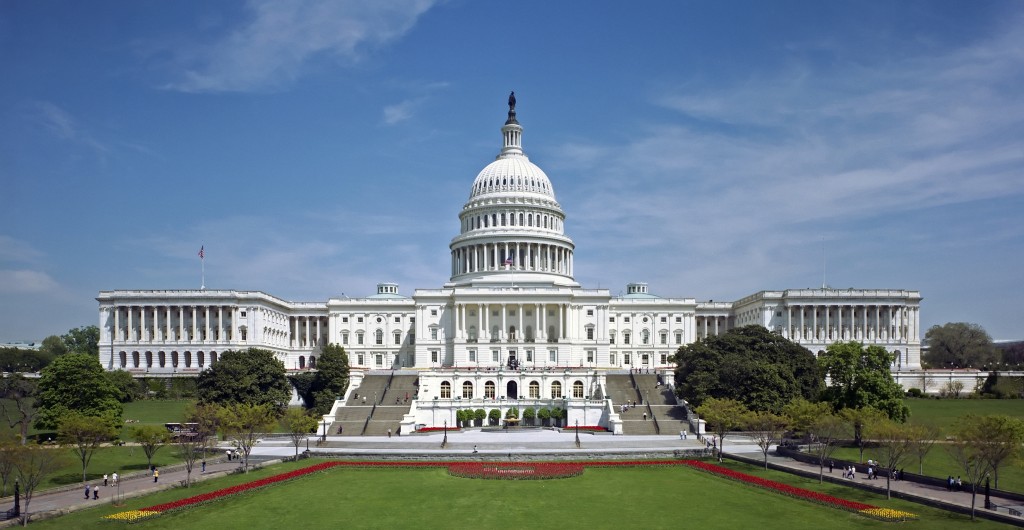
The U.S. House of Representatives came back in session Monday for its final week before a month-long August recess. On Monday, the House is in session and will consider a whopping 17 bills under suspension of the rules. Over half of these bills come from the Homeland Security Committee. A full list of bills can be found here. While not a part of the official House schedule this week, looming in the legislative shadows of Capitol Hill is the pending expiration of federal highway programs and funding. Two weeks ago, the House of Representatives passed an extension bill to provide highway funding through Dec. 18 in order to provide more time for the two chambers to come to an agreement on a full highway bill. However, last week and over the weekend, the Senate took under consideration a multiyear highway bill, putting the upper chamber at odds with the lower chamber as the debate over how to extend funding for the program, and for how long persists. The current authorization expires on Friday. Other legislation on the floor for a vote this week includes: H.R. 427: the Regulations from the Executive in Need of Scrutiny (REINS) Act. This bill aims to increase transparency in the federal regulatory process. The bill would modify the federal rule-making process by preventing “major rules” — those generally having an annual economic impact greater than $100 million — from being implemented unless Congress enacts legislation approving them. This legislation passed the House previously both in 2011 and 2013, but has no chance to pass the Senate and is strongly opposed by President Obama. Alabama co-sponsors: Rep. Bradley Byrne (AL-1), Rep. Martha Roby (AL-2), Rep. Mike Rogers (AL-03) Rep. Mo Brooks (AL-5) H.R. 1994: the VA Accountability Act. The bill expands the ability of the Veterans Affairs (VA) Department to fire or demote VA employees based on performance or misconduct. It also includes provisions to protect VA whistleblowers against retaliation by supervisors Alabama co-sponsors: Rep. Martha Roby (AL-02) H.R. __: VA Budget and Choice Improvement Act. This legislation has yet to be assigned a bill number, but is written to address a $2.5 billion gap in the VA budget. The shortfall is the result of higher-than-anticipated demand for veterans health services and a lack of flexibility to shift money within the overall VA budget, according to the VA. To cover the gap, the VA has asked Congress to allow the VA to divert $3 billion from the “Choice Program,” an emergency fund set up in the wake of last year’s wait-times scandal to subsidize non-VA care for veterans and help reduce the time it takes to get medical appointments. FY2016 National Defense Authorization Act (NDAA). While not officially on the schedule, there has been time set aside to consider a potential conference report that House and Senate conferees are currently working on as differences in the two chambers respective NDAAs remain unresolved.
Alabama business roundup: Headlines from across the state

Here’s a roundup of some of the weekend’s top business headlines from across the state: AL.com: Alabama businesses hope to nip beverage tax in the bud The head of Buffalo Rock Co. said a soft drink tax proposed to help fix the state’s General Fund budget shortfall would hurt the state’s economy. “It’s a job killer and would have an enormous trickle effect throughout our economy,” said Matthew Dent, president and chief operating officer of the Birmingham-based company, which employs 2,100 people. Buffalo Rock is one of about 300 partners signed up for the Stop the Alabama Beverage Tax campaign. They include bottling companies, retailers, restaurants, trade associations, city governments, schools and others. They launched a website, Facebook page and advertisements. Dent said the main goal is to tell people what the group believes would be the harm done by such a new tax. Legislators have not introduced a soft drink tax bill, but Gov. Robert Bentley included it in his proclamation calling the special session. It would be the biggest component in the governor’s proposed $302 million tax increase package. It’s not a first option for the governor, who said he prefers an alternative — repeal of the state income tax deduction for Social Security taxes paid. Either proposal would raise about $180 million annually. Acting Finance Director Bill Newton said the soft drink tax estimate is based on a tax of five cents per 12 ounces. That would add 60 cents to the cost of a 12-pack and about 28 cents to the cost of a 2-liter bottle. Soft drinks are now taxed at the general sales tax rate — a 4 percent state tax plus local taxes. Aside from the added cost of a new tax, Dent said any tax that singles out one industry is the wrong approach. “Buffalo Rock would support a broad-based tax that’s fair and equitable that everybody participates in,” Dent said. The Legislature is in recess and will resume the special session on Aug. 3. Some legislators have indicated that the soft drink tax and the repeal of the Social Security deduction don’t have much support. The governor has also proposed raising the maximum business privilege tax, raising the tax on tobacco products, adding a new tax on vapor cigarettes and some budget reforms. House Speaker Mike Hubbard, R-Auburn, said it was too early to say which proposals have a chance to pass. “I’m just not in a position to talk about which ones we’d move forward with,” Hubbard said. “We have discussed all of them at length. In the legislative process, it’s all about putting together a package that you can get the votes for.” Legislators have been meeting in groups during their recess and are trying to find some consensus. Bentley vetoed the budget legislators passed in June. It would have cut General Fund spending 11 percent, to $1.6 billion. Bentley has proposed a plan that would spend $1.9 billion from the General Fund. Officials say that a budget without new revenue would force cuts in services to the poor and the mentally ill, law enforcement, prisons, courts and other areas. “It’s a hard decision legislators have,” said Virginia Bear, executive director of the Alabama Beverage Association, a bottlers’ organization. “We would hope the solution is fair and broad-based and equitable. A beverage tax is certainly not because it singles out one industry.” AL.com: REEL wins Airbus contract, plans first U.S.-based subsidiary at Mobile Aeroplex at Brookley France-based REEL Group is establishing its first U.S. facility with 4,500-square-feet of office, warehouse, and workshop space at Mobile Aeroplex at Brookley. Monday’s announcement is in direct response to REEL Service Division being awarded the jigs and tools maintenance service provider contract for the Airbus U.S. Manufacturing Facility, also located at Brookley. The newly formed subsidiary, dubbed REEL USA Corp., is expected to create more than 20 full-time positions, and its lease with Brookley allows for expansion as needed. “(REEL’s) expertise in the area of advanced manufacturing processes is a great asset to the growing manufacturing sector in Mobile County and, in particular, to the Airbus U.S. Manufacturing facility at the Mobile Aeroplex at Brookley. We look forward to a partnership with the company and are proud to be the chosen location of REEL’s first U.S. work site,” Mobile County Commission President Jerry Carl said in a prepared statement. Financial terms of the deal were not disclosed. Roger Wehner, executive director of the Mobile Airport Authority, said although Airbus’ state-of-the-art A320 final assembly hangar is “expertly designed,” the actual task of aircraft assembly “will happen via the hands of well-trained employees.” “The jigs and tools elevate them and facilitate the task, and REEL will help them maintain that critical foundation. While REEL will support the Airbus production facility, it also constitutes a critical capability set in our constant evolution, and we know this differentiates us from other communities,” Wehner said. Toulouse, France-based Airbus will launch production this month at its first A320 final assembly line on U.S. soil at Brookley in the company’s ability to efficiently fill the mounting backlog for the popular single-aisle aircraft. The $600 million facility is expected to deliver its first Mobile-assembled aircraft to JetBlue in the second quarter of 2016 and employ about 1,000 people when it reaches full annual production of 40 to 50 aircraft by 2018. Meanwhile, REEL Service Division provides maintenance; installation and commissioning; studies, consulting and expertise; improvements, modifications and compliance; assistance and training. REEL Group member COH, founded in 1969 and located in Quebec, Canada, will also support REEL USA Corp. in its development. For more than seven decades, REEL has specialized in custom-made handling systems for sectors where safety and reliability are major concerns, including nuclear energy, aluminum production, aeronautics, defense and offshore systems. The conglomerate has exhibited particular expertise in the aviation sector by providing and maintaining aircraft docking systems, telescopic platforms and engine-handling systems. Mobile Mayor Sandy Stimpson called REEL a “world-class company” and a “great addition to our community as we seek to expand our advanced manufacturing capability.” “I particularly want to commend the Mobile
Gary Palmer, Mo Brooks pick up Sarah Palin support, checks
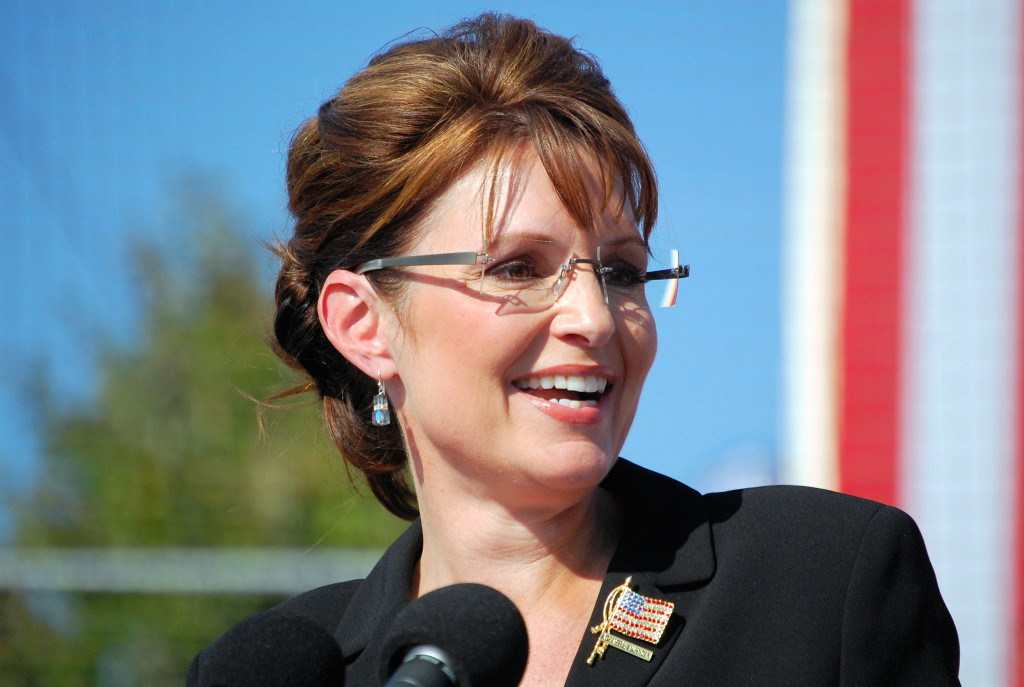
Gary Palmer made a promise on the campaign trail not to vote for John Boehner for Speaker of the U.S. House. That was a promise he kept. Instead, he cast his vote for U.S. Sen. Jeff Sessions to lead the House. Sunday, the blog Conservatives4Palin reported on the latest FEC filings for SarahPAC, 2008 GOP vice presidential nominee Sarah Palin‘s Political Action Committee (PAC), and noted that she gave early to 18 of the 25 members who voted against Boehner. As listed on their website: Those who opposed Boehner and have received early contributions from Sarah PAC include Justin Amash, Rob Blum, Dave Brat, Jim Bridenstine, Jeff Duncan, Scott Garrett, Chris Gibson, Louie Gohmert, Paul Gosar, Walter Jones, Steve King, Thomas Massie, Mark Meadows, Gary Palmer, Bill Posey, Marlin Stutzman, Daniel Webster, and Ted Yoho. Daniel Webster, Louie Gohmert, Jeff Duncan, Trey Gowdy, Jim Jordan, and Ted Yoho all received votes to replace John Boehner as Speaker, and all received contributions from Sarah PAC. Mo Brooks also received a contribution. Though he ultimately ended up voting for Boehner to be speaker he had been outspoken in the past about not agreeing with his leadership. In an interview with The Hill last year Brooks incorrectly predicted that Boehner may not ever run for re-election as speaker. “He is just not acting like an individual who is doing the things you would need to do to get re-elected Speaker of the House,” Brooks said. “It might be the acquisition of the residency in Florida, it might be blaming the Republicans, his own caucus, for the shutdown, it might be blaming his own caucus for the impasse over immigration, it might be the rather salty language he has used to describe some of his own Republican Conference members, but you add all these things, and that’s just not the kind of conduct you would expect from someone who is going to run for Speaker.” On the day of the vote WAAYTV reported that Brooks said, “My intention today is to vote for John Boehner, quite frankly with some reluctance, but he is the best of the options.” When it came to voting against the speaker to send a message he reportedly said, “It’s much like trying to topple a king. Typically speaking if there is a rebellion against the king you better win because if you don’t you lose your head,” Brooks said, “and I don’t believe in symbolic votes on something as important as this.”
Email insights: Robert Bentley named vice chair of NGA Education and Workforce Committee
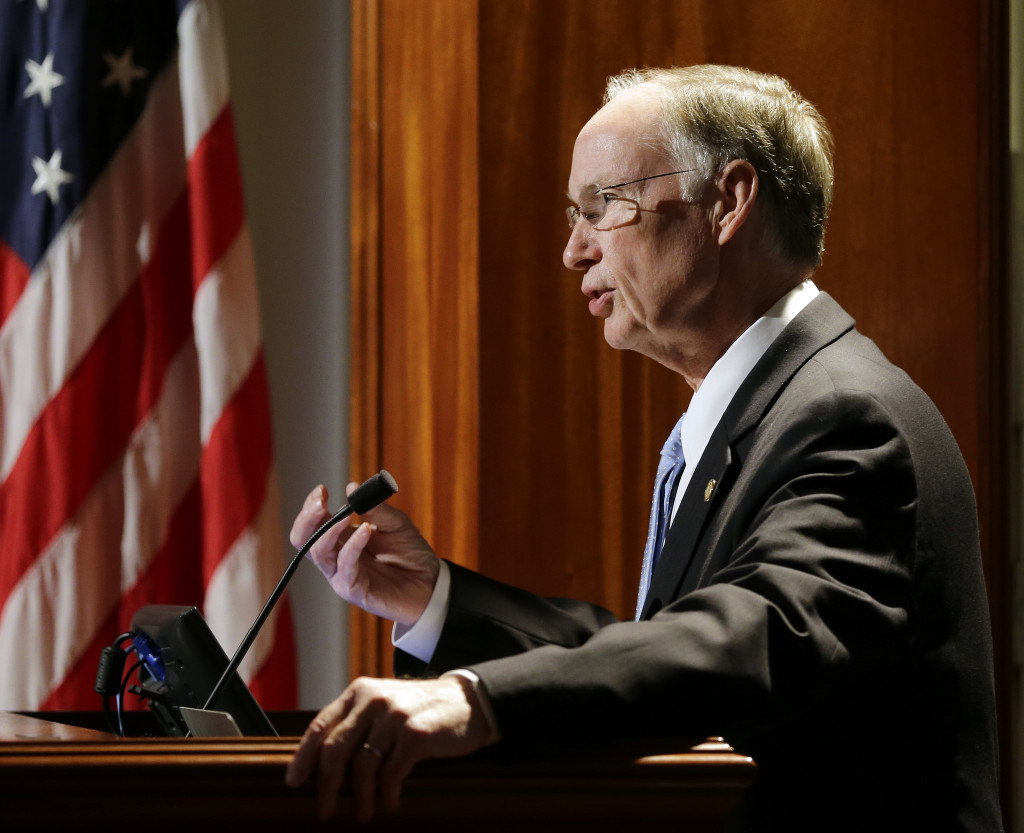
Gov. Robert Bentley‘s media office said Monday that on Saturday he was picked as vice chair of the National Governors Association (NGA) Education and Workforce Committee by NGA Chairman Utah Gov. Gary Herbert and NGA Vice Chairman Virginia Gov. Terry McAuliffe during the 2015 NGA Summer Conference in West Virginia. According to the NGA website, “The Education and Workforce Committee has jurisdiction over issues in the area of education (including early childhood, K-12, and post-secondary) as well as in the areas of workforce development. Members of the committee ensure that the governors’ views are represented in the shaping of federal policy.” The Education and Workforce Committee handles issues dealing with education related to early childhood, K-12 and post-secondary as well as workforce development. Members of the committee ensure that governors’ views are represented in the shaping of federal policy. “Education and workforce development are very important issues to me, and I look forward to serving on the NGA Education and Workforce Committee,” Governor Bentley said. “Alabama has made significant strides in preparing students for success in college and their careers. As governors, we are uniquely positioned to influence federal legislation and regulations that affect education and workforce policies. I look forward to sharing Alabama’s success in the area of workforce development with other governors.” In 2014, Governor Bentley created the Alabama Workforce Council to advise and support members of the State School Board, the Chancellor of the Alabama Community College System, presidents of Alabama’s four-year institutions and the Superintendent of the Department of Education on ways to more closely tailor the state’s workforce education programs with the workforce needs of new and existing Alabama business and industry. During the 2015 Regular Session, Governor Bentley supported and signed legislation aimed at streamlining workforce development efforts across state government, creating a one-stop-shop for job creation and meeting industries’ needs.
Presidential primary brief: 470 days until Election Day
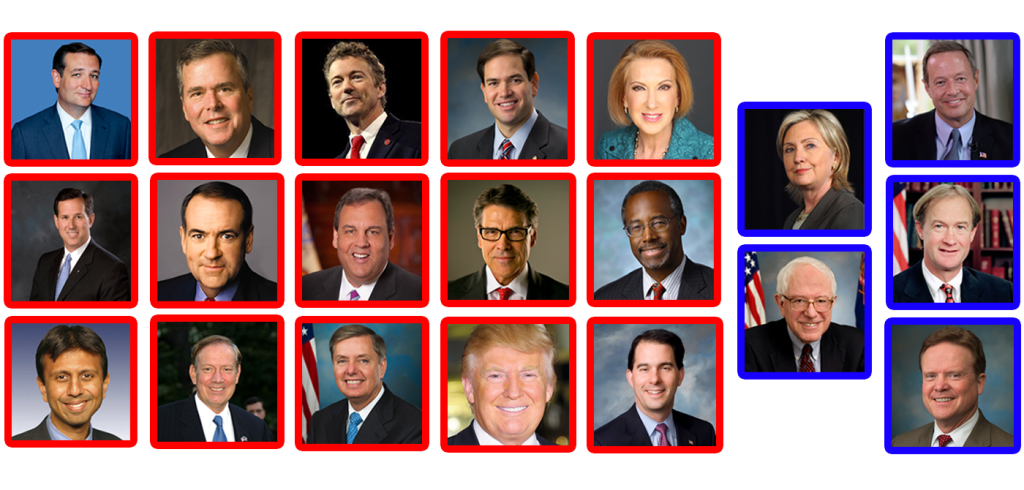
216 days until AL Presidential Primary 470 days until Election Day Convention Dates: Republican July 18-21 2016, Democratic July 25-28 2016 Weekly Headlines: John Kasich becomes 16th Republican to announce presidential bid Donald Trump surging in New Hampshire, Iowa AFL-CIO may delay endorsement of Clinton as 2016 presidential candidate Press Clips Clinton in trouble in Colorado, Iowa, and Virginia (Quinnipiac University Poll 7/22/15) Former Secretary of State Hillary Clinton is behind or on the wrong side of a too-‐close-‐to-‐ call result in match-ups with three leading Republican contenders, U.S. Sen. Marco Rubio of Florida, former Florida Gov. Jeb Bush and Wisconsin Gov. Scott Walker in Colorado, Iowa and Virginia, according to a Quinnipiac University Swing State Poll released today. Perhaps the biggest loser, however, is Donald Trump, who has negative favorability ratings of almost 2-‐1 in each state, the independent Quinnipiac University Poll Ninds. The Swing State Poll focuses on key states in the presidential election. In several matchups in Iowa and Colorado, another Democratic contender, U.S. Sen. Bernie Sanders of Vermont, runs as well as, or better than Clinton against Rubio, Bush and Walker. Vice President Joseph Biden does not do as well. C-‐SPAN scoops Fox News for First GOP candidates encounter (Latin Post 7/20/15) Three days before 10 Republican presidential hopefuls are scheduled to debate on Fox News, many of them will participate in a nationally televised forum hosted by C-‐SPAN. Steve Scully, C-‐SPAN’s politics executive producer, was not shy about touting his network’s scoop, AdWeek noted. “This event is significant” Scully said, “because it will afford the public its first opportunity to hear all of the Republican presidential candidates answer questions on one stage.” So far, the Washington-‐based network has received confirmations from New Jersey Gov. Chris Christie, former neurosurgeon Ben Carson, Ohio Gov. John Kasich, former Hewlett‐Packard Chief Executive Carly Fiorina, South Carolina Sen. Lindsey Graham and former New York Gov. George Pataki. 126 things to know about the 21 candidates running in 2016 (USA Today 7/20/15) With John Kasich’s campaign launch on Tuesday, that’s a whopping 21 candidates who have formally entered the 2016 race. (Still to come? An early August announcement by Republican Jim Gilmore, and a decision by Vice President Biden on the Democratic side.) The parade of contenders into the White House race began in March, when Texas Sen. Ted Cruz announced his bid. Since then, USA TODAY has been compiling facts and tidbits about the large presidential field to help you get to know the men and women seeking the nation’s highest office. Here are the 126 things you should know about 21 presidential candidates: #BlackLivesMatter is winning the 2016 Democratic primary (Time 7/23/15) When Black Lives Matter protestors stormed a room at a meeting in Phoenix and demanded that the 2016 presidential candidates say the names of black people killed by the police, the response was swift: Bernie Sanders did it the next day. “I wish that in the year 2015, I could tell you we have eliminated racism in this country, but you all know that is not true,” said Sanders, to a crowd of more than 11,000 in Houston on Sunday, and then listed the names: “Sandra Bland, Eric Garner, Tamir Rice, Freddie Gray and many, many others.” Donald Trump’s cash will only take him so far in 2016 (Politico 7/23/15) Donald Trump made a bold pledge during his rambling presidential announcement inside the brass-‐laden, marble-‐filled lobby of Trump Tower. “I’m using my own money. I’m not using the lobbyists. I’m not using donors. I don’t care. I’m really rich,” he said. While it’s true that Trump is really rich, the real estate mogul’s Financial disclosure made public this week casts doubt on the idea that he has access to enough cash right now to spend the $1.5 billion or more it’s expected to cost to reach the White House in 2016. Brace yourself, the presidential election is going to be all about anger (NPR 7/26/15) Hillary Clinton laid out some lofty goals for her presidency in a speech on Friday. “My mission from my Nirst day as president to the last will be to raise the incomes of hardworking Americans so they can once again afford a middle-‐class life,” she said. “This is the defining economic challenge not only of this election but our time.” So, she has her work cut out for her. But interestingly, that line came not from a populist barn burner of a speech, but from a policy-‐focused address about ending “quarterly capitalism” — the tendency for businesses to focus on short-‐term shareholder gains over long-‐term investment.
Angi Stalnaker: Your elected officials aren’t psychics. Talk to them.

Our elected officials often claim to be a lot of things but they don’t claim to be psychics. They don’t inherently know what their constituents think about any given issue and they rely on contact from citizens to tell them what they think about the issues before them and to give them reasons to cast a vote one way or another. If you do not reach out to your elected representatives to tell them what you think, they will never know and they will never have the opportunity to take your stance into consideration when it is time for them to cast their vote on the issue or issues that are important to you. With every Facebook and Twitter log-in, I see hundreds of people ranting about their opinions on everything from taxes to flags to slot machines. I have countless conversations with friends and family members who will explain to me, quite passionately, why they feel one way or another about a political issue but those social media posts and those conversations with my politically frustrated friends have one thing in common – They are largely pointless and have little no effect on the outcome of a legislative vote or on the formation of public policy. It may make you feel better to complain to your best friend about the direction of this state or this country but unless you are having the same conversation with an elected official, you are missing an opportunity to help shape the future of our state. The vast majority of politicians want to hear from the people they are elected to represent. They want to know what you think. They want to listen to the reasons you believe the way you do. They are genuinely interested in your point of view. All too often, though, their mailboxes are empty and their phones are silent on issues of importance. Sure, lobbyists like me reach out to them and a handful of active citizens contact them frequently but the overwhelming majority of voters never take the critical and necessary step of making contact with the person who is elected to represent them. That needs to change today. Here are a few tips for getting in touch with the people you hired to represent you in the Great State of Alabama. 1) Know who represents you. It is very common to be unsure of who is elected to represent you. Most people know that our Governor is Robert Bentley and that our President is Barack Obama but not as many people can readily name their State Senator or State Representative. Visit the website for the legislature and click the “Find Your Legislator” button on the right side of the page. Enter your address and the list of people who represent your area will pop right up. Their phone numbers and mailing addresses are also provided. 2) Pick up the phone. Most of us have our phones with us 24/7. Pick up your phone and make a quick call to your Representative or Senator and let them know what you think about the issue that is important to you. Be polite. Make sure they know that you live in their district and be concise. More often than not, they will be glad to hear from you. 3) Put a stamp on it. E-mail is a great thing but emails pile up quickly and it is difficult to read through all of the bulk emails that a legislator gets in a given day. Take a few minutes and write a quick note to your legislator. Make sure that you always include your mailing address at the bottom of the letter so that they will know that you live in area that they represent. Put a stamp on it and let the United States Postal Service do the rest. 4) Use social media effectively. Anyone who has ever sat in the gallery of the House or Senate in the Alabama State House knows that most legislators love their Facebook pages. It is not uncommon to see them checking their Facebook pages from the floor on the legislature to see if any of their voters have checked in on the issues before them. “Friend” your Representative and Senator on Facebook and post a quick note to their social media wall if there is an issue before them about which you are passionate. Now that you know who your elected officials are and how to contact them there are a few things that you can do to ensure that your communication is effective. DO introduce yourself and let them know where you live in their district. DON’T be angry or rude, even if they disagree with you on this specific issue. Always be kind and respectful. DO contact them on issues of which you are very passionate but there is no reason to express your opinion on every single issue that comes up for a legislative vote. Only contact your offical regarding issues that are very important to you. DON’T stretch the truth or provide them with unverified facts. Make sure that you are 100% confident in the information you are providing to your elected officials. Your credibility is key in these situations and so you must be sure you are accurate. DO contact them when they do something you agree with. So often elected officials are only contacted by those that disagree with a vote they cast. If they voted your way, drop them a note to say “Thank You” and “Good Job.” DON’T ramble on. You are busy and so are your legislators. Keep your communication brief and to the point. It will be much more effective that way. Your legislators work for you and they are honored to do so. They want to hear from you and they want to know what you think and what you believe. So, the next time you go on a Facebook rant against higher taxes or engage in an hour long conversation
Mike Huckabee criticizes Iran deal as being similar to Holocaust
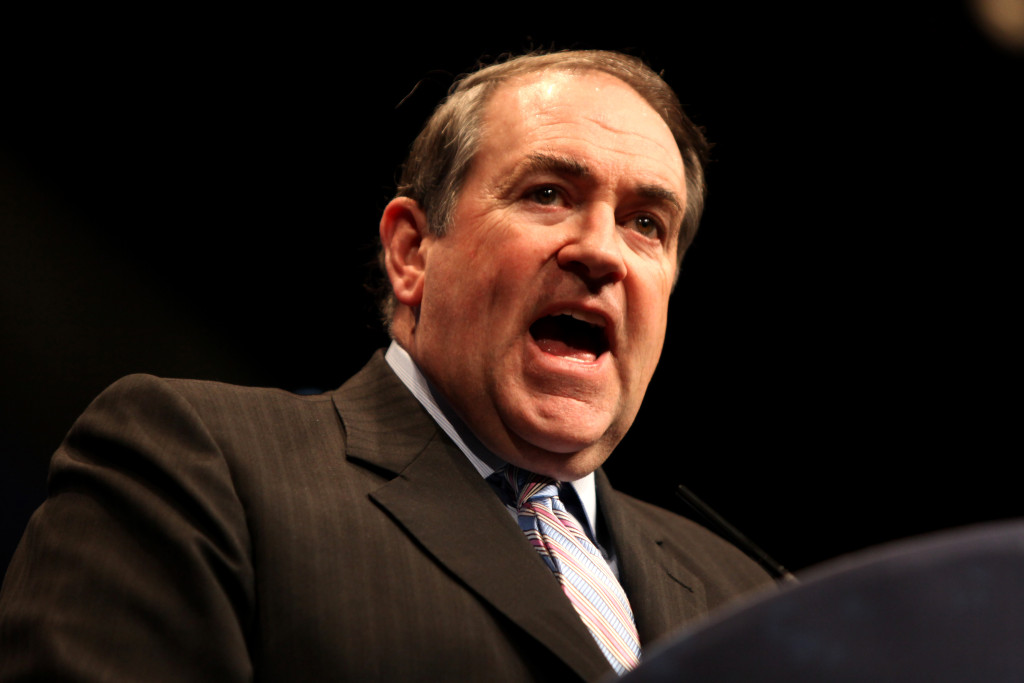
GOP presidential candidate Mike Huckabee is sticking with his controversial criticism of the Iran nuclear deal as “marching the Israelis to the door of the oven,” a reference to the Holocaust. The former Arkansas governor made the tweet Sunday, a day after first making the comparison when denouncing President Barack Obama for his role in the agreement reached by the United States and other world powers. Responding, Democratic National Committee Chairwoman Debbie Wasserman Schultz said Huckabee’s statement was “grossly irresponsible” and called on him to apologize. But a Huckabee spokeswoman said Sunday his comments reflect a longstanding position that “the Iran deal is a bad deal, bad for America and bad for Israel.” Huckabee’s tweet called on Congress to reject the nuclear deal. “This president’s foreign policy is the most feckless in American history,” Huckabee said in an interview with Breitbart News broadcast on Sirius/XM radio Saturday. “He’s so naive he would trust the Iranians and he would take the Israelis and basically march them to the door of the oven.” Huckabee said that “this Iran deal should be rejected by both Democrats and Republicans.” “We forget Iranians have never kept a deal in 36 years under the ayatollah. There’s no reason to think they will suddenly start doing it.” Huckabee said of the deal: “I read the entire thing. We gave away the whole farm. It’s got to be stopped.” Huckabee’s comments come as the GOP presidential candidates struggle to break through with 16 presidential candidates already in the GOP field, and one of those, New York businessman Donald Trump, getting more attention than most. Republished with permission of the Associated Press.
Bradley Byrne: We must stand up for life

As the proud father of four children (and a new grandfather), I have great appreciation for the value of a human life. Every child deserves the opportunity to live a long and prosperous life. That’s why I was so angered by a recent video in which abortion doctors from Planned Parenthood talked casually about harvesting and selling the body parts of aborted babies. In one video, Planned Parenthood’s senior director of medical services talks about how she “crushes” babies in certain ways in order to preserve organs that can then be sold. She mentions how some body parts are worth more money than others. She talks about these distressing topics while casually enjoying her lunch. Just last week, another video was released. In this video, a different Planned Parenthood official discussed the various price options for which the organization would sell fetal body parts. When asked if the price was too low, the Planned Parenthood official responded by saying that she wanted to be able to buy “a Lamborghini.” Let’s be clear: the loss of any human life is a tragedy. Even worse, the casual nature in which the Planned Parenthood officials talk about taking a human life is heartbreaking and appalling. As a parent, but more importantly as an American, these videos make my blood boil. This is not only an emotional debate. In fact, there are also serious legal questions surrounding Planned Parenthood’s actions. Section 42 U.S.C. 289g-2(a) of the federal code makes it unlawful for any person “to knowingly acquire, receive, or otherwise transfer any fetal tissue for valuable consideration if the transfer affects interstate commerce.” In other words, it is against the law to buy or sell fetal tissue in an effort to make a profit. Congress cannot simply sit on the sidelines and wait for someone else to respond. These egregious actions require a response, and I believe Congress should act swiftly to prevent this kind of behavior from occurring in the future. Planned Parenthood receives far too much money from the federal government. Already this year, Planned Parenthood has received almost $46 million in federal grants. Since 2012, Planned Parenthood has banked over $200 million in federal funding. With that in mind, I co-sponsored important legislation designed to eliminate all federal funding for Planned Parenthood. I am a proud co-sponsor of H.R. 3134, the Defund Planned Parenthood Act of 2015. This bill would place a moratorium on all sources of federal funding to Planned Parenthood, including federal grants. I do not think we should stop with just Planned Parenthood though. That’s why earlier this year I voted for H.R. 7, the No Taxpayer Funding for Abortion Act of 2015. This straightforward bill would prohibit federal funding from being used for abortion except in the case of rape, incest, or where the health of the mother is at risk. The House Energy and Commerce Committee and the House Judiciary Committee have already launched investigations into Planned Parenthood, and I applaud them for wasting no time in getting to the bottom of this situation. Congress should not be the only ones launching an investigation. I recently signed a letter to the Justice Department calling for a full federal investigation into Planned Parenthood as it relates to the harvesting and selling of fetal body parts. If the law was broken, then those responsible should be prosecuted to the fullest extent of the law. You can rest assured that I am going to continue to look into this situation and support pro-life policies during my time in Congress. Every single life is precious and worth the fight. Bradley Byrne is a member of the U.S. Congress representing Alabama’s 1st Congressional District.

